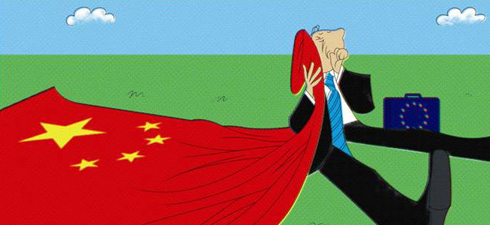It was a very special Sunday morning indeed. Attended by the entire inner circle of major Portuguese corporate CEOs (Energias de Portugal, Banco Comercial Português, Portugal Telecom) at the Palácio das Necessidades in Lisbon, Chinese president Hu Jintao and Portuguese prime minister José Sócrates made no effort to conceal their satisfaction at thedeals just signed by companies from both countries [see box below]. Not a word was said in public about sovereign debt purchases, but Portuguese diplomacy had ample cause for contentment. China is an emerging power to be reckoned with, and a little country like Portugal has everything to gain from a partnership with the Middle Kingdom.
Then again, there’s another side to doing business with Beijing. There is the issue of China’s growing influence in the world – and that of democracy and human rights going by the board. The whole quandary is how to reconcile these two conflicting aspects of the rise of the Chinese leviathan, and there is no consensual answer.
The consequences of rapprochement
Hu Jintao’s visit to Lisbon shows that Portugal is yet another stop on the road to the fulfilment of China’s global ambitions, the reason being that Portugal happens to be a member of the European Union. It would now be absurd to foment fears of economic partnership with China: besides, the Chinese manifestly treat us better than the markets in some democratic countries do.
Still, we mustn’t overlook the consequences of this budding rapprochement between Europe and China. A rapprochement which, incidentally, comes at the very time that Europe and the United States are gradually pulling apart. The geostrategic balance of the whole planet is now shifting in the wake of a war waged with euros, yuans and dollars. And this war spells the death of the Western dream of giving Beijing lessons in democracy. That is the biggest risk of doing business with China. Our oh-so-convenient forgetfulness poses a threat to Europe’s most intangible and yet most important asset: being viewed throughout the world as a realm of freedom.
In Figures
Multi-digit deals
The contracts and bilateral trade agreements signed by Chinese president Hu Jintao and Portuguese prime minister José Sócrates on 7 October in Lisbon amount to$1 billion (€718 million), according to estimates in the Chinese press relayed by Diário de Notícias. The Portuguese daily explains that Portugal and China signed four cooperation deals and nine trade agreements, involving companies such as Portugal Telecom, EDP, Huawei, Millennium BCP and ICBC. Even though the question of Beijing’s buying Portuguese debt was scrupulously avoided in the official statements, "it wasdiscussed in the meetings that preceded the signing ceremony,” reveals the Lisbon-based daily, adding that "Portugal has already put on the market93% of its planned bond issues for this year". Meanwhile, new Portuguese newspaperi observes that the deals with China are but the first step towards the financial recovery of Portugal, which also aims to forge ties with other emerging markets like Indonesia and Singapore.
Was this article useful? If so we are delighted!
It is freely available because we believe that the right to free and independent information is essential for democracy. But this right is not guaranteed forever, and independence comes at a cost. We need your support in order to continue publishing independent, multilingual news for all Europeans.
Discover our subscription offers and their exclusive benefits and become a member of our community now!












